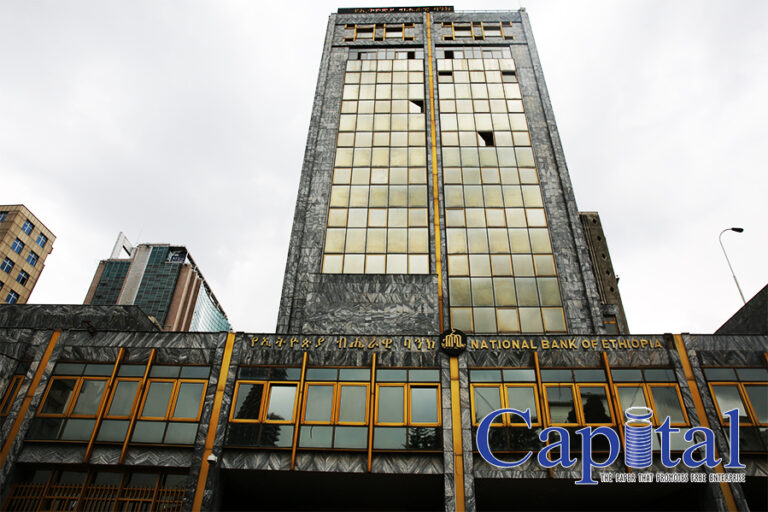The report from the National Bank of Ethiopia (NBE) for the fourth quarter of the 2020/21 fiscal year shows the industry sector taking hold of the major piece of the pie with regards to access to finance while T-Bill register astronomical spike.
The quarterly report that was published by the National Bank of Ethiopia (NBE) which covers April, May and June of 2021 saw 105.9 billion birr in fresh loan being disbursed showing a 66.2 percent annual increment.
From the stated 105.9 billion birr in fresh loan, which is one of the record amounts in the fresh loan disbursement in the country, the disbursement share for the private banks to this colossal sum for the three months was 60.2 percent, while the remainder was the cut for the state owned financial institutions.
Extraordinarily, the industry sector took the major portion with 26.4 percent followed by international trade, which topped in the third quarter.
According to the quarterly report, the industry sector accessed 27.9 billion birr, while international trade secured 23.6 billion birr. Moreover, the agriculture sector took 14.5 billion birr whilst the domestic trade received 10.6 billion birr.
In the stated period, the banking system was able to collect 67.5 billion birr; with the share of the private banks to this contribution being 63.5 percent.
NBE’s report, which is for the last quarter of the 2020/21 fiscal year, stated that the total outstanding credit of the banking system including corporate bond reached 1.3 trillion birr with 24.3 percent increment compared with the same quarter of last year.
The report indicated that in the stated period the broad money supply stood at 1.3 trillion birr exhibiting a 30 percent annual expansion as a result of 25.9 percent growth of domestic credit and 1.4 percent increase in other items. In the third quarter, the broad money supply was about 1.2 trillion birr.
For the broad money supply growth on annual base, the narrow money contributed 24.7 percent while quasi money took a large chunk of 75.3 percent.
From the narrow money supply, the share of currency outside banks was 133.6 billion birr showing an incline of 22.5 percent from a year ago and 4.8 percent compared with the third quarter of the 2020/21 fiscal year.
From the quasi money, the share of saving despot received a boost of 38.6 percent compared with the same quarter of last year and stood at 816.4 billion birr.
The report said that the yield on T-bills significantly improved following the introduction of market based T-bills auction. The report showed that a weighted average yield on T-bills increased from 6.6 percent in June 2020 to 9.97 percent in June 2021.
The amount of T-bills supplied to the bi-weekly T-bills auction during the fourth quarter of the fiscal year 2020/21, reached 130 billion birr, reflecting a 367.8 percent increment over last year same period.
“Similarly, the demand for T-bills rose by 376.1 percent relative to a year earlier to birr 126.8 billion. Thus, the value of T-bills sold stood at Birr 110.6 billion, about 438.4 percent higher than last year same quarter,” the report said.
Of the total amount non bank institutions bought T-bills worth 57.3 billion birr while the share of banks was 53.2 billion birr.
In the stated period the total capital of the banking system reached 153.7 billion birr and the share of public banks stood at 51.8 percent which was below half in the past two quarters.
The total capital of the banking system in the preceding quarter was amounted to 125.1 billion birr.
Industrial sector takes largest chunk in 4th quarter
Ethio telecom starts international remittance
After Ethio telecom received a green light from the National Bank of Ethiopia to start international remittance through its mobile money platform Telebirr which is gaining a large number of customers, the sole telecom operator launched its service as of yesterday Saturday, November 20.
Ethio telecom during the last couple of weeks was integrating its system with its international partners and conducted various testing of the system.
Ethio telecom announced that you can then either go to the nearest telebirr agent and receive your cash or transfer it to your bank account.
With telebirr International Remittance Service customers can receive remittance from most parts of the world including the US, Canada and Australia.
The telecom giant also announced that a 5% e-money bonus will be available on every remittance value received. It also said that the maximum daily cash out limit for customers who received remittance is for level 1, is 5,000 birr whilst for levels 2 and 3 customers is at 50,000 birr.
It also announced that both registered telebirr users and unregistered mobile users can receive international remittance.
Currently, there are 11 million and growing subscribers of telebirr with over Two billion birr being transacted through telebirr. So far, 26,442 agents have been providing telebirr services across the country with 9 banks being integrated with the platform.
It is to be recalled that, the telecommunications CEO said that the new service, telebirr, will mark a shift for Ethiopia, where the banking system is seen as inefficient with 19 commercial banks serving a population of about 115 million. To this end, within the coming five years about 50 percent of the total Ethiopian economy or 3.5 trillion birr in transaction is expected to go through telebirr.
Telebirr is a mobile money service developed by Huawei. It took five months for Huawei to develop the end-to-end service which facilitates the delivery of cashless transactions. The platform deployed currently has the capacity of processing up to 100 transactions per second (TPS) and can be scaled up to 1000 TPS in the future according to Huawei. The service is accessible via SMS, USSD, and smartphone applications. Telebirr for ease of usability also works in five languages.
Insurers formally submit letter of protest to NBE
The insurance industry formally submit their protest to the National bank of Ethiopia (NBE) on the decision of the government that forces insurance firms to buy 15 percent bond from Development Bank of Ethiopia (DBE) from their total net profit.
In a letter submitted in the past weeks through the Association of Ethiopian Insurers states that the decision will affect the industry’s growth.
Recently, the government through NBE amended existing rules and directives or introduced new monetary policies and directive to control the inflationary behavior in the market and improve the financial industry.
Similarly, the NBE board announced that it will continue to closely monitor economic and financial developments and stands ready to utilize all available policy tools at its disposal to ensure price and financial stability consistent with its legal mandate.
Under article 4.1 of ‘investing in Development Bank Bond Directive No.SIB/54/2021/’ NBE order all insurers except the state owned Ethiopian Insurance Corporation, stating that an insurance company will invest an amount equal to a minimum of 15 percent of its net income in DBE Bond.
Article 4.2 of the directive says an insurance or Ethiopian reinsurance company shall invest the amount stated under article 4.1 within 90 days after the close of its financial year.
The Bond shall have a maturity period of three years and shall pay a bond rate at least two percent points higher than the minimum interest rate paid on saving deposit at the time of issuance. Currently, the minimum deposit rate is seven percent that means that on this rate the DBE Bond interest rate is nine percent.
The directive that becomes effective as of September 1 stated that DBE Bond shall be paid annually. However, players in the insurance industry did not accept the decision that the government took.
Sources told Capital that the directive may not have bold and direct effect on insurance firms compared with its outcome on shareholders.
“As per the directive of NBE, the amount that would be invested on the bond is the property of shareholders who secure it through annual dividend, due to that it significantly affects shareholders,” a senior insurance industry expert said.
According to another expert the effect on shareholders who would like invest their dividend on other investment activities or for those who are using their annual profit from their share to lead their life would be much higher.
Those who have big share on the insurance company and shall get significant dividend may invest their profit on other projects that is vital for the economy, “but the current decision would affect their investment activity directly and by in large the economy,” added the expert.
Similarly, those who have small share but use their dividend to lead their day to day life as a pension would fall victim to the NBE directive.
“In general it is a decision that would be seen in a command economy. The government cannot pass a decision on private property and it is a tendency of socialist mindset,” another expert on the sector said.
Similarly, under ‘investment on DBE Bonds Directive No.SBB/81/2021/ NBE introduces that commercial banks shall annually invest a minimum of 1 percent of their outstanding loan and advance in DBE Bond until the aggregated bond holding equals 10 percent of their outstanding loans and advances.
In its meeting on August 27, 2021, the Board of Directors of the National Bank of Ethiopia decided to modify the reserve requirement, the interest rate on individual banks’ lending facility, the forex surrender requirement, and the forex retention rights.
The statement announced after the meeting stated that outstanding credit to the private sector grew at 40.8% (year on year) in July, and disbursement during the month grew at about 125 percent, compared to the same period of last year.
“Such a rapid growth of credit poses significant risks to price and financial stability, in the context of a rising inflation which reached 26.4 percent (year on year) in July. Consequently, the Board has decided to raise the reserve requirement on birr and foreign currency deposit liabilities held by commercial banks to 10 percent, from the current level of five percent, effective on September 1st, 2021,” it added. Banks are given a transition period of 3 months to meet the 10 percent reserve requirement.
Coffee and spices surpass earning expectations
Ethiopia has earned 425 million dollar from export of 112,614.84 tons of coffee and spices in the first four months of the Ethiopian fiscal year.
The Ethiopian Coffee and Tea Authority explained that during the first four months of the fiscal year, it had planned to export 97,144.42 tons of coffee and spices with target earnings of 317.44 million USD. In actuality, it exported 112,614.84 tons which is 16 percent higher than planned garnering earnings of 425.0 million USD which registered 134 percent of the plan.
As the authority disclosed, the comparison from last year same period revealed that the revenue had shown 188.91 million dollar in increase which is 80 percent greater as the volume grew by 40,814.28 tons or 56.84 percent compared to same period of the previous fiscal year.
In the month of October alone, the country has exported 91.46 million dollar worth of coffee, tea and spices. This was also higher than the expectation which was 71.74 million dollars from an export target of 22,444.06 tons of coffee and spices. The country has export 23,694.18 tons showing 6 percent increase while the earnings reeled in 127 percent of the plan.
Compared to the same period last year, the revenue has also shown an increase of 44.41 million dollar and 94.39 percent by 8,782.57 tons or 58.9 percent.
The Authority has placed Germany, Saudi Arabia and Belgium as top three destinations for Ethiopian coffee during the four month period, which started on July 8, 2021.
Accordingly, Germany imported a total of 27, 874.10 tons or 26 percent of the total coffee from Ethiopia, resulting in 90 million dollars or 22 percent from the total in revenue.
Following Germany was Saudi Arabia which imported more than 15, 928 tons or 14 percent of coffee bringing in 53.40 million dollar or 13 percent of the revenue.
A net worth of 46.43 million dollar and 11,023.14 tons has been exported to Belgium which is 11 percent of the total revenue and 11 percent of the export.
U.S, Japan, South Korea, Italy, China, France and Taiwan ranked from 4 to 10 as top 10 destinations for Ethiopian coffee in terms of revenue generated which account for 83 percent of the total and 82 percent of total income, according to the authority. “Overall, these top 10 destination countries showed an increase of 77 percent in revenue and 94 percent in revenue compared to last year.”
The performance has shown impressive records with both the export volume and value exceeding the target set for the four months
With deteriorating political crisis in Ethiopia, Africa’s biggest coffee producer, has not been disrupted in exports and growers expect another record year as foreign rivals struggle.
The nation exported 250,000 tons during the marketing year that ended July 31, earning a record 910 million dollar, according to authority figures. Ethiopian coffee exports are forecasted to reach 280,000 tons in the current fiscal year generating 1.1 billion dollars.






